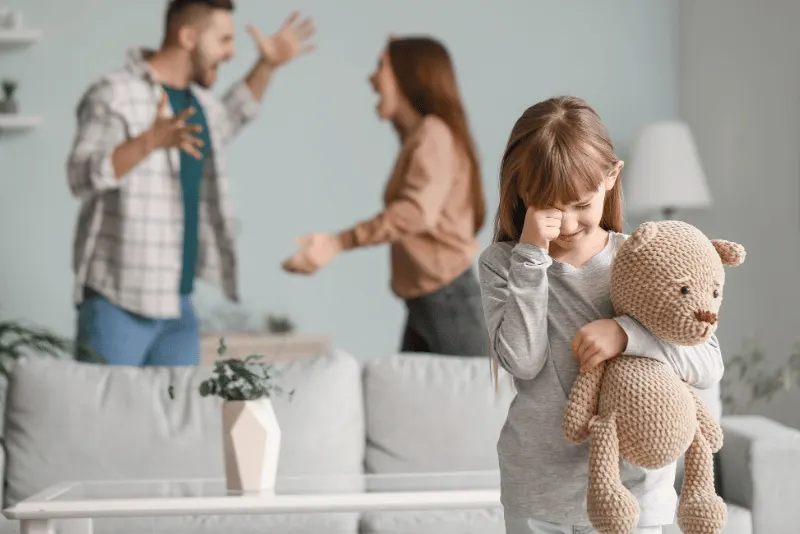Domestic Violence & How It’s Used by DCF to Intrude into your Life
Physical, Emotional, Verbal, Financial, Social, and more…
When a report of domestic violence is made, the Department may treat it as a case of MA DCF domestic violence if children are believed to be in danger. MA DCF domestic violence investigations can deeply disrupt families—even after a single incident. While DCF is tasked with protecting children, many parents have found their lives turned upside down after a misunderstanding or false report involving domestic violence.
Domestic violence, or intimate partner violence, can happen to anyone of any race, age, sexual orientation, religion, or gender. According to the National Coalition Against Domestic Violence, more than 10 million women and men experience intimate partner violence every year in the United States.
Behaviors associated with domestic violence
One of the biggest dangers of MA DCF domestic violence allegations is that even isolated incidents can be interpreted as part of a pattern. Here are just a few behaviors that can be associated with domestic or intimate partner violence:
- Frighten
- Intimidate
- Terrorize
- Manipulate
- Hurt
- Humiliate
- Blame
How can I tell if my partner is showing domestic violence?
Does your partner…
- Treat you roughly such as grab, push, pinch, shove or hit you?
- Throws things or punches walls when angry?
- Make you feel like you cannot make decisions?
- Intimidate, criticize, embarrass, or threaten you?
- Make you feel worthless?
- Blame you for how they feel or act?
- Sexually pressures you?
- Make you feel like there is “no way out” of the relationship?
- Tells you what to wear and controls how you look?
- Control your money and spending?
These are just a few examples of what domestic violence can look like. If your partner has a pattern of any of these examples, then you may want to look at your relationship and think about whether it is benefitting you. Victims of domestic violence can be in denial about their relationship until the small patterns escalate into bigger problems. Sometimes, people outside of the relationship will pick up on the patterns before you do.
If you have children, it is even more important to be aware of how your partner treats you. Not only are there safety concerns for the child, but children often develop their own behavior by watching their role models. In the event the police get involved, you do not want to risk losing your child and getting your parental rights terminated by overlooking the signs of domestic violence.
Physical Abuse
Physical violence is the intentional use of force against someone that can cause death or injury. 1 in 4 women and 1 in 7 men have been victims of severe physical violence by a partner in their lifetime. Specific examples of physical abuse include:
- Shoving
- Choking
- Shaking
- Slapping
- Punching
- Use of a weapon against someone
Emotional/Psychological Abuse
Emotional or psychological abuse is intentionally causing harm to a partner with threats, humiliation, control, and lies. Some examples include:
- Controlling what the victim can do or where they can go
- Withholding important information from a partner
- Deliberately doing something to make the victim feel diminished or embarrassed
- Isolating a partner from their friends and family
- Degrading or humiliating the victim in public or private
- Undermining the victim’s confidence or self-worth
- Threatening to take a victim’s children away from you
Domestic violence often starts as emotional abuse before turning physical or sexual. Subtle emotional abuse can be more harmful than direct aggression because it causes the victim to think they are crazy. The effects on mental health are long lasting and can also result in physical illnesses.
Sexual Violence
Sexual violence can be divided into three categories:
- Physically forcing someone to engage in a sexual act unwillingly
- Forcing any sexual act involving someone who is ill, diabled, or under the influence
- Abusive sexual contact
Almost half of rape victims in the United States were raped by someone they know. Within that population, 45.4% of female rape victims were raped by an intimate partner. Sexual assault is used in a relationship to intimidate and control a partner. As a result, a domestic violence victim can suffer from high rates of depression and anxiety.
Stalking
Stalking is any pattern of harassing or threatening behavior. It often occurs when an abuser wants to display control over a partner. 60.8% of females stalking victims and 43.5% of men reported being stalked by a current or former intimate partner. Examples of this include:
- Sending the victim unwanted presents
- Following the victim
- Damaging property
- Appearing at a victim’s home or workplace
- Spreading rumors about the victim
- Posting the victim’s personal information and harassing them online
Stalking can be in-person or online. Cyberstalking shares a lot of the same traits as stalking. However, a cyberstalker can steal your personal information and identity.
Although it does not involve physical contact with a victim, it is still a serious crime. According to Massachusetts law, those convicted of stalking can face prison time for up to five years and fined up to $1,000.
MA DCF Domestic Violence and the Risk of Homicide
Massachusetts releases the number of homicides caused by domestic violence every year. 72% of all murder/suicides involved an intimate partner; 94% of the victims of these crimes are female. In recent years, DCF has reported a significant decrease in the number of reports of abuse and neglect made by both non-mandated and mandated reporters by about 50%.
In the United States, 1 in 7 women and 1 in 18 men have been stalked by an intimate partner to the point they believed that they or someone close to them would be harmed or killed. A survey conducted by the National Domestic Hotline found that 10% of victims claimed their abuser had fired a gun during an argument. 67% of the victims in the survey firmly believed their abusers were capable of killing them.
According to Massachusetts state records, domestic violence has led to many more homicides in the previous decade than ever before. Between 2003 and 2012, 266 victims were murdered in “intimate partner homicide.” In the same time frame, 74 perpetrators of domestic violence were killed. This large number of homicides is why the governor of Massachusetts declared domestic violence a public health emergency back in 2008.
Domestic Violence In Massachusetts
According to Trial Court statistics, there are thousands of restraining orders filed each year because of domestic violence:
- In 2021, there were 21,100
- In 2020, there were 39,500
- In 2019, there were 42,800
Domestic violence happens in any home and takes many different forms. It usually does not get reported until it turns physical, but it can start out with verbal and emotional abuse. It could also be through male privilege, isolation, financial restriction, and psychological control through intimidation and coercion. These small patterns can turn into major problems.
How MA DCF Handles Domestic Violence Allegations in Massachusetts
The Massachusetts Department of Children and Families (hereinafter “DCF”) takes allegations of domestic violence and child neglect very seriously. Massachusetts DCF may step in and do random unannounced home visits on a family suspected to be suffering from domestic violence. They can send law enforcement to your home to check on your family. Officers will take your children into a separate room and ask them if they feel safe at home. If they suspect a parent is abusing their partner, they can arrest that parent in front of the children.
If the police suspect an immediate threat to children, they can also take the children away to live with complete strangers in a government foster home. Your children will stay there until DCF and the courts decide what to do next. This can leave your children feeling lonely, confused, and missing their families. No child deserves to be taken away from the home and family they love
The chances of domestic violence are higher when drugs and alcohol are involved. 55% of domestic violence cases involve alcohol use alone.
Arguments can escalate from normal squabbles to violent arguments quickly. According to 911 statistics, domestic violence accounts for 21% of all violent crimes nationwide. The primary reason for women’s homelessness is domestic violence. It is a serious epidemic that keeps causing continuous harm to our society and the well-being of our children.
Domestic Violence Laws in Massachusetts
There is no specific “domestic violence” charge in Massachusetts. Instead, different crimes can fall under the category of domestic violence. In Massachusetts, domestic violence serves as a category that any felony or misdemeanor can fall into. The most common charge associated with domestic violence in the state of Massachusetts is assault and battery.
In Massachusetts, domestic violence is any criminal act of abuse committed by a family or household member. These family members can be a spouse or ex-spouse, a partner you are living with, a relative, or a co-parent. Domestic violence can also take place in a relationship where you are not living together, which is called a “substantive dating or engagement relationship.” For this, the court will look at the length of the relationship, the frequency of interaction, and whether the relationship has ended and for how long.
When there is domestic violence involved in a crime, it adds additional time and money to the sentence. For example, someone convicted of assault and battery can be sentenced to 2.5-5 years, and be charged thousands of dollars. The victim of a domestic violence crime in Massachusetts cannot drop the charges. This can only be done by a prosecutor.
An example of a specific charge would be assault, which is the use of physical force. Assault and battery is making physical contact that is unwanted or likely to cause harm, such as kicking someone.
This is even more severe when you violate a restraining order. Violating a restraining order can also be considered domestic violence. When filing, the alleged abuser is called the “defendant” and the victim is called the “plaintiff” It can add another 2.5 years and a fine of up to $5,000. A 209A protective order can:
- Prohibit a defendant from contacting the plaintiff and their children
- Order the defendant to stay away from a residence or workplace
- Award a plaintiff temporary child custody
- Restrict visitation with your children
- Order a defendant to pay temporary spousal or child support
- Order a defendant to pay restitution for any losses as a result of the abuse
- Order a defendant to pay the plaintiff’s lawyer fees
If you feel you are in immediate danger, the court can issue an emergency protective order without notifying the defendant ahead of time. This is called an “ex parte” order. Once it is issued, the defendant is notified right away and given a chance to appear in court within ten days of the order. If the defendant does not appear in court within 10 days, the order stays.
You can also file a Harassment Prevention Order, or a 258E Order. These can be used to protect you against anyone, regardless of what the relationship is. In order for a judge to approve a Harassment Prevention Order, someone must have committed three or more of the following acts:
- Acts that were willful and malicious
- Were aimed at you
- Were intended to cause you fear, intimidation, abuse, or damage to property
- Did cause you fear, intimidation, abuse, or damage to property
- Forced you into sex or threatened you into having sex
- Committed one of the following crimes against you:
- Indecent assault and battery
- Rape
- Statutory rape
- Assault with intent to rape
- Enticement of a child
- Criminal stalking
- Criminal harassment
- Drugging for sex
The presence of a gun in a domestic violence situation increases the risk of homicide by 500%, so most laws are centered on limiting an abusers ability to obtain a weapon. Massachusetts laws prohibit abusers and stalking from possessing firearms. If you have a restraining order filed against you because of domestic violence, a judge can order you to surrender your guns and gun license. If a victim of domestic violence calls the police, they can confiscate any weapons found in the home when responding to the call.
Domestic Violence Causes
Abusers can feel the need to control a partner for a number of reasons:
- Anger management issues
- Jealousy
- Low self-esteem
- Feeling inferior
- Cultural beliefs
- Psychological disorder
- Learned behavior from growing up in a home with domestic violence
- Alcohol or drugs
Domestic violence can result from depression. Hurt people will hurt people. Those who physically and emotionally abuse others tend to have negative thoughts and ideas about themselves. This concerning mental state has the tendency to turn small disagreements into violent situations, and can turn into a pattern of verbal and physical abuse.
If you feel that your partner exhibits forms of domestic abuse, the best course of action is to contact a mental health professional to address the source of the behavior. Physical and emotional violence stems from deep unresolved emotions. Therapy will help the abuser understand their emotions and respond to conflict with healthier reactions. It may also help to attend family therapy to help solve issues in the home together. It’s better to speak to a professional rather than let unresolved feelings fester and burst out.
Domestic Violence Effects On Children
According to the US Department of Justice, 1 in 15 children are exposed to intimate partner violence each year, and 90% of these children are eyewitnesses to one family member assaulting another. 40% of American children were direct victims of two or more violent acts, and 1 in 10 were victims of violence five or more times. A child’s exposure to domestic violence increases the likelihood that the child will be exposed to more violence in the future.
A child who witnesses domestic violence will typically respond in one of three ways: yelling, seeking help, and trying to get away. A clinical study found that 11% of domestic violence calls were made by children exposed to their parents fighting in their presence.
Violence in the household can have terrible consequences for children’s mental health. Some children can be used as pawns in a violent relationship. Abusive partners can threaten a parent that they will take the child if they try to leave.
Children who witness domestic violence tend to do badly at school, and can have a harder time making friends and socializing. They can develop post-traumatic stress disorder, which causes nightmares, headaches and leads to jumpy reactions. They can also develop anxiety and depression.
Some children will develop regressive behaviors, such as sucking their thumb. They can forget skills they have learned such as tying their shoes, or stop paying attention during school. Domestic violence can be so traumatizing to a child that it takes up their entire mental space and they are unable to thrive and have healthy childhoods.
Since violence is a learned behavior, a pattern of physical violence might develop when dealing with their classmates or friends. Once children see such behavior being used by their parents and role models, they see violence as an acceptable behavior to use on others. Children who witness domestic violence are three times as likely as their peers to behave violently. This causes some teachers to suspect domestic violence in the home when they see children hurting their classmates.
Effects of domestic violence can continue into adulthood, continuing a cycle of aggression and manipulative behavior. This can affect the child when they grow up when it comes to relationships and parenting. It continues the cycle of violence into the next generation.
Massachusetts law is very strict with domestic violence charges. If a Massachusetts court determines that a parent is abusive, the abusive parent will lose custody of their children and even lose visitation rights.
A judge terminating your parental rights can cause further complications in your child’s mental health. It is traumatic to see parents berate and fight one another. It is tragic to not be allowed near your parents.
Economic Impact
Domestic violence hurts the abused, children, and society as a whole. The CDC estimates 3.6 trillion dollars in loss of productivity due to domestic violence. Economic abuse can also prevent someone from leaving their abuser. The United States economy as a whole is being extremely hurt by this public health crisis.
Victims of domestic violence have very little financial control, and many of these victims are women. According to the Institute for Women’s Policy Research (hereinafter “IWPR”) survey, about three in four respondents (73 percent) had abusers take money from them against their wills. This includes their hard-earned paychecks, savings, or public benefits. Examples of this include:
- Controlling how a victim can access or use their money
- Forcing a victim give the abuser their cash, debit card, or credit card
- Demanding a lease or mortgage be in the abuser’s name
- Using a victim’s credit or debit card without their knowledge
This abuse can lead to financial trouble by damaging your credit score. It can take years to undo the damage done through financial abuse and repair your credit. Two-thirds of the IWPR survey respondents said that their partner’s behavior negatively affected their credit score, education, and job training opportunities. Coerced debt is when an abuser forces non-consensual transactions, such as:
- Forcing the victim to apply for credit cards or loans
- Opening an account in the victim’s name without their knowledge
- Refinancing a mortgage or car loan without a victim’s knowledge
Education is a huge contributing factor to whether people are able to get higher-paying jobs, especially women. Domestic violence is preventing women from doing well or finishing school. Their future may be more limited than it would have been before the ill-fated relationship. Between 21-60% of survivors of intimate partner violence lose their jobs due to reasons stemming from domestic violence. In the United States, victims of domestic violence lose a total of 8 million days of paid work each year. Some examples of economic abuse in the workplace include:
- Preventing victim from attending a job
- Forcing them to quit their jobs
- Harassing the victim while they are at work
COVID-19 Effect on Domestic Violence
Data collected from police departments across the United States provide some early insight into the effect COVID-19 has had on domestic violence in some regions. For example, Boston had a dramatic increase of 27% in aggravated domestic violence assaults in 2020 as a result of the pandemic.
Victim’s Rights
Anyone facing MA DCF domestic violence accusations should speak with a lawyer immediately before speaking with DCF or police. According to federal law, a victim of domestic violence has the following rights under 42 U.S.C. Section 10606(b):
- The right to be treated with fairness and with respect for the victim’s dignity and privacy
- The right to be reasonably protected from the accused offender
- The right to be notified of court proceedings
- The right to be present at all public court proceedings related to the offense, unless the court determines that testimony by the victim would be materially affected if the victim heard other testimony at the trial
- The right to confer with the attorney for the Government in the case
- The right to restitution
- The right to information about the conviction, sentencing, imprisonment, and release of the offender
These rights are meant to protect victims from any future harm, and prevent the abuser from continuing to traumatize their partner. Unlike a DCF investigation, they are meant to help victims move forward with their lives with the least amount of intrusion into their lives.
Help is Available
If you are the victim of a domestic violence crime, it is normal to feel scared, helpless, and vulnerable. Remember there are agencies that exist to help you:
Domestic Violence Hotline
1-800-799-SAFE (7233)
National Coalition Against Domestic Violence
1-303-839-1852
If you are in Massachusetts, there are many resources available depending on where you live within the state. Mass 211 consists of hotlines, shelters, therapists and advocacy groups:
https://mass211.org/domestic-violence-resources/
![]() Kevin Seaver is a trusted Massachusetts DCF Lawyer Specialized in DCF since 1991.
Kevin Seaver is a trusted Massachusetts DCF Lawyer Specialized in DCF since 1991.







